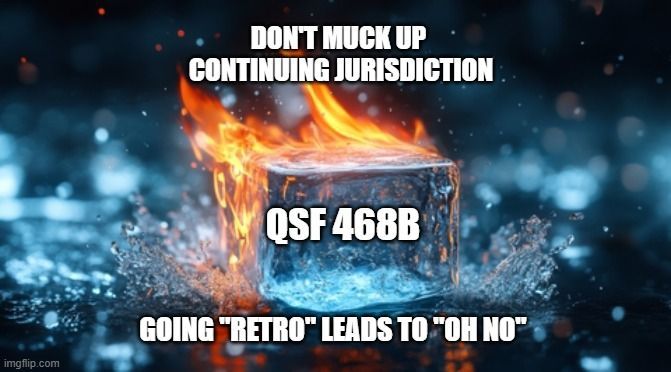Many QSF administration companies are formed solely as ordinary business entities and are not structured as regulated financial entities. The lack of regulatory oversight raises some issues worth noting.
§ 1.468B-1 Qualified settlement funds
(a) In general. A qualified settlement fund is a fund, account, or trust that satisfies the requirements of paragraph (c) of this section.
(c) Requirements. A fund, account, or trust satisfies the requirements of this paragraph (c) if -
(1) It is established pursuant to an order of, or is approved by, the United States, any state (including the District of Columbia), territory, possession, or political subdivision thereof, or any agency or instrumentality (including a court of law) of any of the foregoing and is subject to the continuing jurisdiction of that governmental authority;
(2) It is established to resolve or satisfy one or more contested or uncontested claims that have resulted or may result from an event (or related series of events) that has occurred and that has given rise to at least one claim asserting liability -
(i) Under the Comprehensive Environmental Response, Compensation and Liability Act of 1980 (hereinafter referred to as CERCLA), as amended, 42 U.S.C. 9601 et seq.; or
(ii) Arising out of a tort, breach of contract, or violation of law; or
(iii) Designated by the Commissioner in a revenue ruling or revenue procedure; and
(3) The fund, account, or trust is a trust under applicable state law, or its assets are otherwise segregated from other assets of the transferor (and related persons).
Who can serve as trustee?
An entity may not serve as a “Trust Company” unless they have obtained a fiduciary license from a state or the OCC. It is a violation of state and federal law for an entity to act or represent itself as a trust company without a license to perform fiduciary services. Yet major settlement administration firms have, on more than one occasion, held themselves out to the courts as the “trustee” of the QSF despite not having the required licenses.
Regulated entities have financial controls, internal and external audit, systems, and segregation of externally audited and tested duties. Non-Regulated entities typically do not have the same level of financial controls. Small firms and “one-man” shops do not have staffing and system resources to perform adequate segregation of duties and financial controls. There have been numerous and ongoing reports in the financial community of misappropriated funds due to lack of internal controls and duties segregation.
Engaging in the Unauthorized Practice of Law
Non-regulated entities are not law firms and do not have the standing, like a licensed trust company, to engage in legal activities associated with the production of legal documents (trusts.)
Lack of Transparency and Recordkeeping
Non-Regulated entities are not bound by the same transparency and recordkeeping rules as licensed trust companies.
Failure to Comply with the Bank Secrecy Act
Non-regulated entities typically do not perform the duties required under the Bank Secrecy Act (CIP, KYC, AML.) Although they engage in the transmission of funds and would fall into
FinCEN’s
catch-all definition.
“A “financial institution” subject to regulation under the BSA is a term of art that covers a much wider array of businesses and institutions than what one would normally think of as a financial institution. See 31 CFR Section 5312(a)(2). The definition includes:
1. An insured bank;
2. A commercial bank or trust company;
3. A private banker;
4. An agency or branch of a foreign bank in the United States;
5. Any credit union;
6. A thrift institution;
7. A broker or dealer registered with the Securities and Exchange Commission under the Securities Exchange Act of 1934;
8. A broker or dealer in securities or commodities;
9. an investment banker or investment company;
10. A currency exchange;
11. An issuer, redeemer, or cashier of travelers’ checks, checks, money orders, or similar instruments;
12. An operator of a credit card system;
13. An insurance company;
14. A dealer in precious metals, stones, or jewels;
15. A pawnbroker;
16. A loan or finance company;
17. A travel agency;
18. A licensed sender of money or any other person who engages as a business in the transmission of funds, including any person who engages as a business in an informal money transfer system or any network of people who engage as a business in facilitating the transfer of money domestically or internationally outside of the conventional financial institutions system;
19. A telegraph company;
20. A business engaged in vehicle sales, including automobile, airplane, and boat sales;
21. Persons involved in real estate closings and settlements;
22. The United States Postal Service;
23. An agency of the United States Government or of a State or local government carrying out a duty or power of a business described in this paragraph; and
24. A casino, gambling casino, or gaming establishment with an annual gaming revenue of more than $1,000,000.
The definition also includes two ‘catch all’ provisions that empower FinCEN to consider any business or agency as a financial institution if it engages in any activity that is similar to, related to, or a substitute for any activity in which any business described above is authorized to engage. 31 CFR Section 5312(a)(2)(Y).
The second ‘catch all’ also authorizes FinCEN to designate any other business as a financial institution if that business has cash transactions that have “a high degree of usefulness in criminal, tax, or regulatory matters.” See 31 CFR Section 5312(a)(2)(Z).”
The risk of transmitting funds (particularly in large mass tort and class action cases) to a person listed on OFAC /FinCEN database could result in material liabilities for all parties.
Read more about Qualified Settlement Funds
#QSFadministration #QSFtrustee #QSF #468B #qualifiedsettlementfund #qualifiedsettlementfundtrustee #468Btrust #QSFmanagement #qualifiedsettlementdfundmanagement #qualifiedsettlementfundsadministration #personalinjury #settlementplanning #masstort #settlement #personalinjurylawsuit


